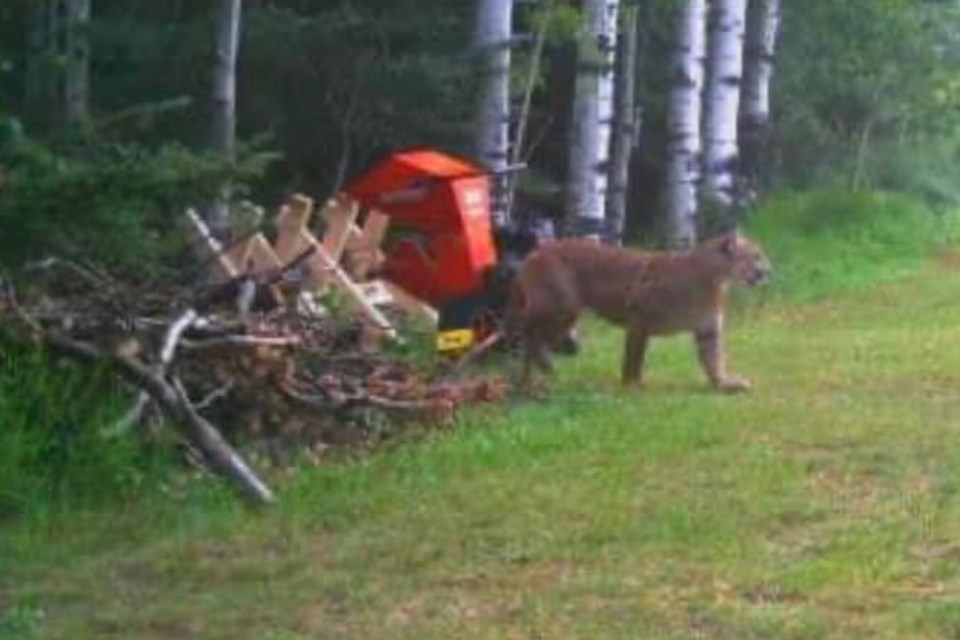SUNDRE – A cougar was recently captured on trail camera video footage while travelling through a rural property south of town.
However, there have not yet been any reported, let alone confirmed instances of, conflicts between the predator and people, domestic pets or livestock.
Dean Unruh posted on local social media a screenshot taken from footage he recorded on July 15 at 7:40 a.m. showing a sizeable cougar emerging from the tree line at a rural property south of Sundre on Highway 760 that he calls home.
“I have a number of trail cameras on my property near Sundre, and I see lots of wildlife on a daily basis,” Unruh wrote in response to follow-up questions.
He added he has installed both types of trail cameras – those that require the user to physically remove the memory card to review footage as well as other units that are wirelessly connected to a phone and send images directly when motion is detected.
“This particular image came through to my phone within two minutes of the cougar going through,” he told the Albertan.
“This is the only time I have seen this cougar come through.”
However, Unruh added there is another cougar roaming around the area based on conversations he’s had with neighbouring acreage owners.
“I know they had a problem cougar a few years ago that took out a lot of livestock,” he said. “I have lost a couple of cats this year, but that could be a cougar, coyote, or birds of prey.”
But he does not begrudge predators for following their instincts. Fully cognizant of what it means to live in the country on nature’s doorstep, he said, “you always need to be aware and understand you are sharing the wilderness with many types of animals.”
Prevention is perhaps the most important aspect of reducing the potential risk of conflicts, he said, adding garbage that can provide a tempting and easy meal for many animals should be properly secured.
“The best steps you can take to mitigate and minimize animal encounters is to properly dispose of food and food waste in sealed garbage bags, and never to leave food out,” he said, adding situational awareness is also crucial.
“And when moving through areas frequented by animals, make noise to let them know you’re coming,” he said. “The best wildlife encounter with an apex predator is no encounter at all; they are more afraid of us than we are of them and will leave the area before we get there if they know we are coming.”
Firmly closing up and locking doors at night, including outbuilding such as sheds, shops and garages, is also advisable, he said.
“I also have a number of motion detectors,” he said. “Flood lights that activate with motion, nocturnal animals don’t like being spotlighted.”
At the end of the day, it all boils down to being mindful of our surroundings and respecting the fact that “we are sharing space with animals,” he said.
“I have had coyotes, fox, skunks, rabbits, bears, deer, moose, and now a cougar come through my property,” he said. “It’s one of the incredible benefits of living in a rural setting.”
A passionate outdoorsman with a soft spot for animals, Unruh said he also enjoys hunting.
“I have a great deal of deep love and respect for animals, but I also like to harvest and consume them,” he said. “Every animal harvested in an ethical and natural way is one less animal consumed through industrial food practices.”
Sometimes, he replaces a firearm with a camera, and Unruh said he eventually hopes to pursue photography as a “retirement gig.”
Levi Neufeld, Sundre’s district Fish and Wildlife officer, said cougar sightings in the West Country are not particularly rare.
“It’s quite common for them to be travelling through,” said Neufeld.
“We do have a healthy cougar population,” he said, adding the local habitat offers everything wildlife could need: food, water and shelter.
With the increased prevalence of trail cameras and closed circuit home security surveillance systems, there are more and more pictures being captured as the years go on, but that does not necessarily mean there are more of the animals, he said.
“They’re always travelling up and down the Red Deer River,” he said.
Landowners, especially rural properties, are encouraged to follow good husbandry practices. Above and beyond steps such as securing food waste and garbage, Neufeld also recommends man’s best friend and encourages people to keep smaller pets leashed.
Sightings, encounters or even conflicts with either cougars or other predators like bears can be called into the 24-hour Report a Poacher hotline at 1-800-642-3800, he said, adding the local office is only open during business hours and not always able to promptly respond.



